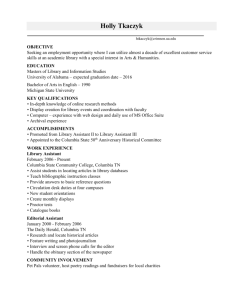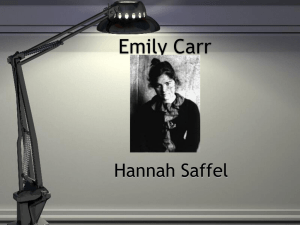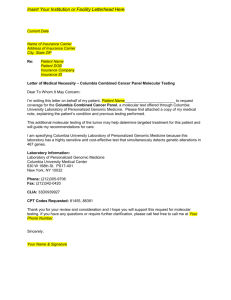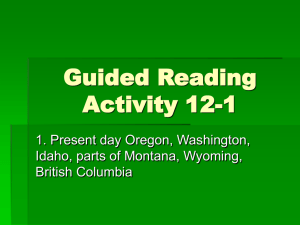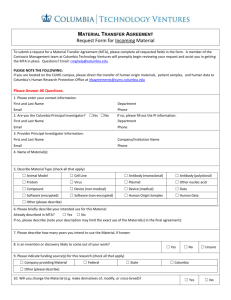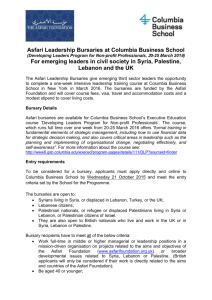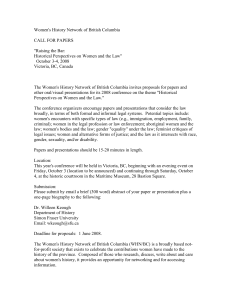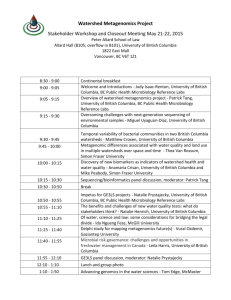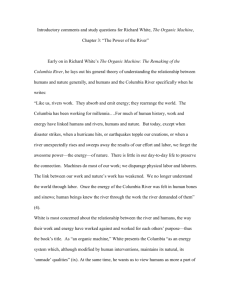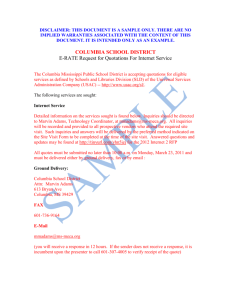Frequently Asked Questions (FAQ)
advertisement
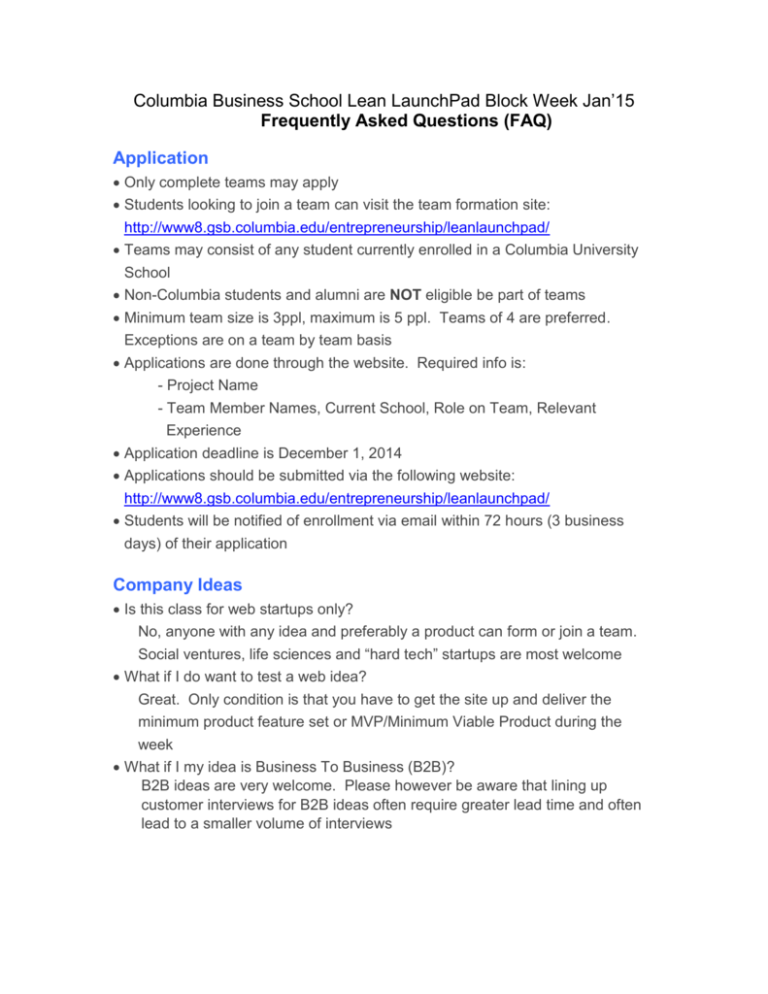
Columbia Business School Lean LaunchPad Block Week Jan’15 Frequently Asked Questions (FAQ) Application Only complete teams may apply Students looking to join a team can visit the team formation site: http://www8.gsb.columbia.edu/entrepreneurship/leanlaunchpad/ Teams may consist of any student currently enrolled in a Columbia University School Non-Columbia students and alumni are NOT eligible be part of teams Minimum team size is 3ppl, maximum is 5 ppl. Teams of 4 are preferred. Exceptions are on a team by team basis Applications are done through the website. Required info is: - Project Name - Team Member Names, Current School, Role on Team, Relevant Experience Application deadline is December 1, 2014 Applications should be submitted via the following website: http://www8.gsb.columbia.edu/entrepreneurship/leanlaunchpad/ Students will be notified of enrollment via email within 72 hours (3 business days) of their application Company Ideas Is this class for web startups only? No, anyone with any idea and preferably a product can form or join a team. Social ventures, life sciences and “hard tech” startups are most welcome What if I do want to test a web idea? Great. Only condition is that you have to get the site up and deliver the minimum product feature set or MVP/Minimum Viable Product during the week What if I my idea is Business To Business (B2B)? B2B ideas are very welcome. Please however be aware that lining up customer interviews for B2B ideas often require greater lead time and often lead to a smaller volume of interviews Attendance and Participation This class mimics the environment of a startup in many ways. Therefore, this is a very intense class with a very high workload. If you cannot commit to extremely long days inside and outside the classroom, this class is not for you You cannot miss a day of class or evening of teamwork without prior approval If you urgently need to miss a class, please let the TA and your team members know ahead of time via email. We expect your attention during our presentations and those of your fellow students. If you’re getting bored, tired or inattentive step outside for some air. If we see you reading email or browsing the web we will ask you to leave the class. There are no remote options for this course - you must take the class on campus We ask that you use a name card during every session During your classmates’ presentations you will be required to give feedback and rate their presentations. Please bring a laptop to every class and be prepared to give your undivided attention to the team at the front of the room Intellectual Property Who owns the intellectual property tested in the Business Model? - Unless there are previous claims to your IP (Columbia University, outside participants, Tech Transfer, etc.), you and your team own all IP brought into and generated/created during the course - If there is any uncertainty about claims to IP, or if you are working on a University related technology, (i.e. either research from one of the team members or a University patent), you must check with Columbia Technology Ventures (http://techventures.columbia.edu/) to get a clear understanding of any claims on your IP - You and your team members need to disclose to each other what IP/Licensing rights any company you’ve worked at has to inventions you make at school - Please note that Columbia University is not responsible for any other IP related issues arising from this course. If you or a subset of your team decide to start a company based on this class, you should consult qualified legal council with any IP, equity or other related issues I feel my idea / Business Model may become a real company and the "next killer app" and I want to own it myself what should I do? This is more than likely the wrong class to take. Your slides, notes and findings will be publically shared (see here for examples from past classes: http://www.slideshare.net/sblank/tagged/Columbia). *******If you plan to pursue your idea after class, we suggest using a fake or alternate name for your company during the class in order to avoid your in class work showing up later during online searches.******** Your team owns everything done in class. Discuss Intellectual Property rights with your team from the beginning. If you can’t come to agreement with the team, join another team, pick another project, or drop the class. Remember anything you do and learn in the class is public Will my Intellectual Property rights be protected when I discuss my ideas with the class? NO. This is an open class. There are no non-disclosures. All your presentations and Customer Discovery and Validation notes, business model canvas, blogs and slides can, and more likely will, be made public. This class is not an incubator. At times you will learn by seeing how previous classes solved the same class of problem by looking at their slides, notes and blogs. Keep in mind that successful companies are less about the original idea and more about the learning, discovery and execution. (That’s the purpose of this class.) Therefore you must be prepared to share your ideas openly with the class. It is a forum for you to "bounce" your ideas off your peers. I’m not comfortable sharing what I learn with others what should I do? Don’t take this class. Help! What kind of support will our team have? The teaching team consists of a total of six professors and two TAs (see syllabus for names). Their job is to guide you as you get out of the building. Every team will be assigned one “office hours” session with a faculty member in the first three days of the week. If your team hits a roadblock or needs more “office hours,” faculty will be available Wednesday and Thursday before and after class. Schedule a time with the senior TA via email in advance. Can I recruit a mentor or advisor for our team from outside the faculty? By all means, do so. Good entrepreneurs seek all the help they can get from friends, classmates, colleagues, and sometimes even competitors. Look around the class to find engineering, marketing, and other expertise and ask if they’ll spend some time with you and/or your team. I need help now. Your first stop is your TAs. Email or sit down with them during the week if you have a problem. Your professors have office hours every day before and after the class and breakout sessions. If you need something resolved sooner, email your TA. In a serious crisis (even a crisis of confidence), call Bob Dorf at (203)253-3656 before 11pm. Leave a concise message if he isn’t available to take your call. Team Dynamics What roles are in each team? Traditionally, each team member is part of the “customer development team”. You have to figure out how to allocate the work. Ideally the team will organize around a “CEO,” often the member who brought the idea to the class. What if my team becomes dysfunctional? Prepare to work through difficult issues. If the situation continues, approach the teaching team. Do not wait until the end of the week to raise the issue. What if one of my teammates is not "pulling his/her weight"? Try to resolve it within your team. If the situation continues more than 36 hours, please approach the teaching team. Final grades will also reflect individual participation and contribution. Team members will evaluate the contribution of each member individually in a confidential email at the end of the week. This grade, particularly “downgrades,” have significant impact on your grade for the class. Grading ▪ How do you determine our grade? Please see the grading criteria section of the syllabus What kind of feedback can I expect? Continual feedback every day, every time you present. Substandard quality work and/or a lack of sufficient customer interviews and interaction will be immediately brought to your attention.
